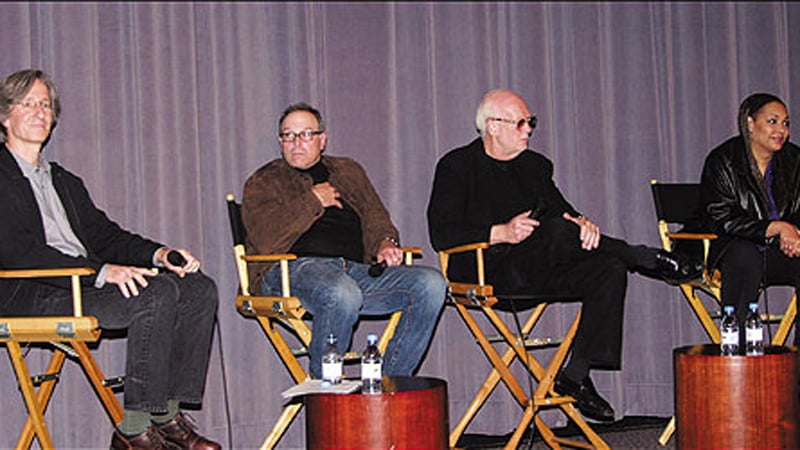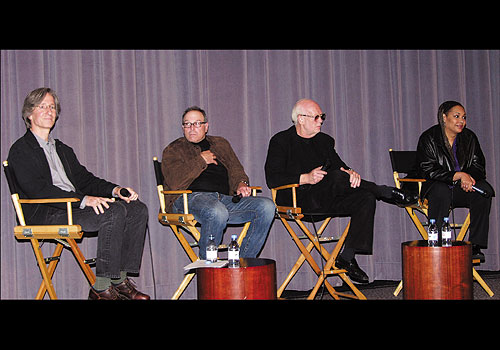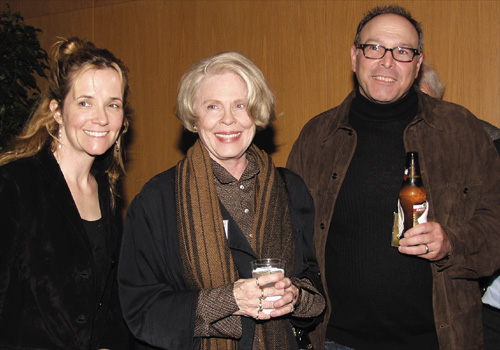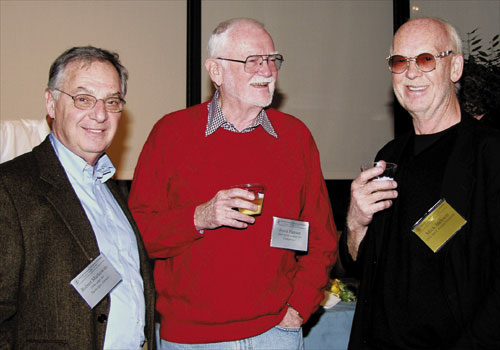It's never been easy to direct movies for television," according to DGA Third Vice President Paris Barclay as he introduced the panel of directors nominated for DGA Awards for their work in movies and television.
"It's a given that you have less time, less money and more interference than theatrical feature filmmaking," Barclay said. "And today we [have] many other challenges. In the last decade, the percentage of network programming obtained from independent producers has declined from 68% to 24%. Along with the diversity-chilling effect of that, there's the proliferation of reality programming, [which] is threatening the very existence of scripted programming. Yet tonight we do celebrate some of our most talented and resourceful directors, who make creative use of their imaginations and grace us with sophisticated, provocative, high-quality [work]."
Three of the five nominated directors appeared on the panel: Julie Dash (The Rosa Parks Story), Howard Deutch (Gleason), and Mick Jackson (Live From Baghdad). Richard Loncraine (The Gathering Storm) was working in the United Kingdom and unable to attend, and John Frankenheimer (Path to War) passed away last summer. His widow, Evans Frankenheimer, was there however, and she briefly took the podium to share some words: "John would have been so honored to be nominated by his peers. He loved the Directors Guild, he loved directing, and he had joy and passion about this particular project. He felt very strongly in the last decade of his life that by working in cable movies he could do subjects that he just couldn't do anywhere else."
Later, Mrs. Frankenheimer added that Path to War's story of LBJ and Vietnam was one that her husband had long wanted to tackle, largely because he was fascinated by the deeply flawed nature of the president. "John did not feel that cable movies were any different from the way you approached a [theatrical] movie," she said.
Moderator Mick Garris began the discussion by noting that all the nominated movies were true stories. He asked about the challenges of that, and followed up with questions on casting, brief shooting schedules, and the differences in approach between television and theatrical pictures.
Gleason was Howard Deutch's first television movie, and for him the biggest challenge was neither the shifting time periods of the story nor the fact that Jackie Gleason's estate did not cooperate with the project. Rather, it was the 19-day shooting schedule. Much of the film involved complex choreography which had to be painstakingly worked out. "I'd like to say we had a plan, but there was no plan. It was just, 'how do we get this done?' I didn't think we would make it to the finish line."
To speed things up, Deutch consolidated sequences into very few shots or even one whenever possible. He also never stopped working. "Whenever we had a day off, or weekends," he remembered, "we'd be rehearsing. So there was no day off. My memory is we never stopped. We'd rehearse that night for the next morning. We were also rewriting at the time. It was just a mad dash."
Dealing with the movie's four different time periods, Deutch recalled, was "a greater hardship on other departments than [it was on] me. For wardrobe it obviously was a killer. They had to have it done and ready." On the subject of network interference, Deutch quipped, "I was lucky, because somebody [at CBS] got fired. They were so busy with the network politics that I didn't hear much from them, which was great."
Asked how he would have approached Gleason differently had it been made for theatrical release, Deutch said, "I would have just asked for a lot more time. It's a movie. I don't think the approach is any different. The ad breaks were odd for me, but we cut it together and looked at it as a whole. The network loved it, and then we dealt with the breaks."
He said, "I've done features with much longer schedules where I was having less fun and it wasn't working as well. Sometimes having everything I want, on a feature, gets in the way. You don't move as quickly, and you have the luxury to second-guess yourself, which is not always good."
Mick Jackson strongly agreed, declaring that "terror is an underrated factor of creativity!" His HBO movie had a 40-day schedule, longer than Deutch's and Dash's combined, but the scope of the story made it challenging nonetheless. "I've shot things in 100-plus days," Jackson said, "where it was still a struggle to make the schedule. Your ambitions always run ahead of the schedule and the budget, whoever you are."
While Jackson cast Michael Keaton as CNN producer Robert Wiener "because he was so like this character," he picked Helena Bonham Carter "because she was so unlike her part. I thought there was something in her that would respond to the challenge of this guerrilla movie going out there without adequate rehearsal and then trying to find the movie."
The "guerrilla" approach was appropriate to the film's subject matter. "We shot masses of material every day, and curiously that seemed to become a true expression of the way in which journalism is done. It is done on the fly, it comes at you very rapidly, and you don't have time to second-guess. Indeed, that's the environment in which often difficult, ethical decisions are made ... In the middle of ducking bullets, the mechanics of reporting, and worrying about competing with other networks, you can actually have a very important issue go by and almost not see it."
Jackson re-created Baghdad in "the more exotic parts of Culver City and in Morocco," he said. He knew his production designer had done a good job in using period photos to re-create the past when some of the CNN reporters who'd actually had the story "walked onto the set and tears started coming out of their eyes. It was like walking back into history."
Had Live From Baghdad been a feature film, Jackson also "wouldn't have approached it differently. There is no essential difference between a TV movie and a feature. You're doing a movie, and you put your best into it. The best thing about moving back and forth between the two is that each informs the other. You do a television movie, and you're more ambitious about it. You do a feature, and you think, 'well, why can't I shoot this as fast as I shoot a television movie? Wouldn't it have more energy that way?'"
The main challenge facing Julie Dash in telling The Rosa Parks Story was to make Parks "more of a human being and less of an icon. It was rough, because people tend to be very comfortable with mythology." For example, Dash said, in the scene where Parks is taken off the bus, a CBS executive wanted the director "to add a loop line of her saying, 'I didn't want to get up off the bus because my feet hurt.' They wanted to make her a nicer person to make the audience like her. The problem is, it's not true! Most children know that's not true. And it's not the point."Dash shot the film on location in Montgomery, Alabama, using actual locations wherever possible. The famous bus scene was shot on "the actual spot where it happened. I wanted that vibe. It was great, and Angela [Bassett] really got into it." Accomplishing this period shoot in just 19 days, Dash said, was made easier by "a great art department. I'd done independent historical features, and you learn to work with what you have in order to get the thing made." She also cited her relationship with DP David Claessen. "We'd worked together many times before, on other cable movies, videos and commercials, and we just have this way of code-speaking."
Dash would have expanded her film much more had it been a feature. "I think there's a lot missing in terms of explaining Jim Crow or the colored section. And Rosa Parks was not the only woman who was ever thrown off a bus. That's bothered her all of her life, that people keep focusing on her. I actually shot two other women being thrown off the bus, but they refused to let it in the film because they felt we didn't need it or that it took us off-story. Off whose story?"
At a post-panel reception, past winners and nominees of DGA Awards mingled with the audience. Everyone had an opinion on the state of the genre (it's generally quite high), the differences between directing features and television movies (there aren't many), and the continuing threat posed to DGA members by reality programming (opinion was mixed).
Overall, the number of television movies being made is way down, but as Joe Sargent (1973 winner for The Marcus-Nelson Murders) put it, "The silver lining on a dark cloud is that they're pushing for more substantive content and more exciting cinematics, and that has pushed [directors] to develop their craft and ask more of themselves." Robert Markowitz (1996 nominee for The Tuskegee Airmen), however, warned that while cable networks are much more open to exploring controversial subjects, "that will become less so as conglomerates take them over."
As for the differences between features and television movies, there was much consternation over the basic classification of the two. "The process is exactly the same," declared Jeff Bleckner (2001 winner for The Beach Boys: An American Family). "You're telling a story with cameras." Markowitz agreed, adding that "reviewers don't understand the role of the director in movies for television that it's no different than it is for features."
Sargent took issue with the term "movies for television," suggesting "features for television" instead. "It conjures up something inferior," he said. "These films are feature-quality. The delivery system is all that's different." But Jerry London (1980 winner for Shogun) thought any "stigma" of television is basically gone, except in the case of feature producers who resist hiring directors with only television work on their résumé. "It's really silly because it's harder to shoot a television movie than it is a feature."
While all agreed that reality programming is a serious job-drainer, opinions varied on how long the damage will last. Many shared the opinion of Allan Arkush (1999 nominee for The Temptations) who called it "the flavor of the month." Others felt differently, such as London, who said reality programmers "aren't threatening it, they're killing it. We're losing 100-150 movies a year that's a lot of work. They're getting big numbers and they're cheaper. Why should the networks spend more money for less viewers?"
Ron Lagomarsino (1992 winner for the Picket Fences pilot) sounded hopeful. "Ultimately, audiences want to be entertained. They want stories. There's always going to be a demand for that. It's just a matter of how the stories are told and what is going to fill the current need. This is making everyone reexamine things, which I think is healthy."



